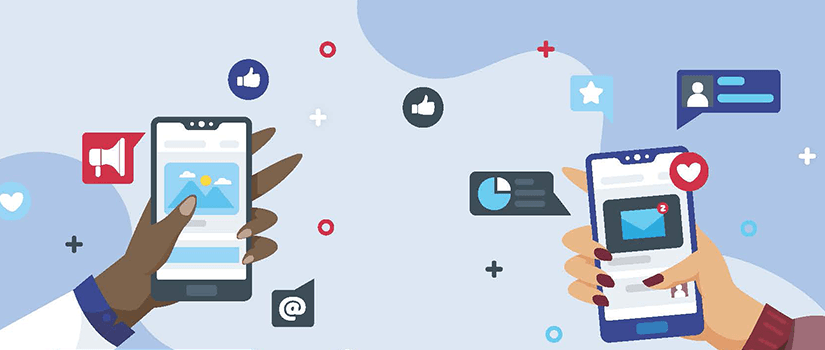From community pharmacies to clinical education, social media is changing how pharmacists communicate
It is an undeniable fact that social media has infiltrated nearly every aspect of our daily lives. Whether it is Facebook, Instagram, Twitter or LinkedIn, most of us log in to social media in some form for personal or professional use.
In the world of pharmacy, social media has become a useful promotional tool in retail businesses as well as academic and clinical settings. Professional organizations such as the American College of Clinical Pharmacy, the American Association of Colleges of Pharmacy and the American Society of Health-System Pharmacists have developed guidelines on best practices in using social media.
For community pharmacies, social media has become a touch point for their patients and customers, informing them of important events such as vaccination clinics, educational seminars and sale specials, and helping customers learn more about the staff.
Addison Livingston, ‘97, owner of Hawthorne Pharmacy and Medical Equipment in Columbia, South Carolina, recognized that promoting his stores through social media was a business necessity.
“I knew it would be imperative that we have a social media presence in today’s world to promote ourselves as innovative and knowledgeable,” he says. “All of that brings value to our patients.”
Livingston recognized that if his company was going to be active on social media, he needed to have someone on his team who was trained in its use. So he hired Andrea Fuhrman, who earned her Bachelor of Arts from the University of South Carolina School of Journalism and Mass Communications and a Master of Business Administration from the Darla Moore School of Business.
“One of my biggest challenges is to ensure we are putting out communications that are tailored specifically for each of our stores,” she says. “Understanding the demographics of each store and the clientèle they serve is a key part of producing appropriate messaging.”
At Medicine Mart in West Columbia, South Carolina, owner Lynn Connelly, ‘78, admits that while he does not post on social media himself, he understands the need for a social media presence.
“We can tell when we post health tips or an event coming up that we get a response from our customers,” Connelly says. “It helps enhance the trust our patients have in us.”
Jennifer Wicker, a pharmacy technician at Medicine Mart, coordinates the social media efforts for the store by creating posts and using content provided by third-party companies.
“We use RxLocal and SOCi,” she says, “and with one click, I can post to all our platforms — Facebook, Twitter, Instagram and LinkedIn — and even our website.”
Since Jarrod Tippins, ‘09, opened THE Pharmacy in Florence, South Carolina, in 2016, he has used social media to promote his pharmacy, primarily through Facebook and Instagram.
“We used targeted advertising and saw an immediate impact, starting from day one, filling around 33 prescriptions a day, to several hundred daily,” he says. “I’ve tried all methods and I feel I get more bang for my advertising dollar by boosting posts through social media advertising.”
Clinical pharmacists are finding social media to be helpful in sharing information and networking among colleagues. Julie Ann Justo, clinical associate professor in the department of Clinical Pharmacy and Outcomes Sciences, uses Twitter to share information and says it helps make her a better clinician.
“Key thought leaders in my field are already prominent on Twitter,” she says. “Using social media gives me the ability to reach out to the pharmacy and infectious diseases worlds, gather information about new clinical trials, and ask real-world clinical questions. I can stay up-to-date on current and historical evidence. It’s also a great way to quiz my trainee followers and teach them about infectious diseases.”
Brandon Bookstaver, ’04, who helped research health practitioner’s views on social media as an educational resource, limits his social media use to Twitter and uses the platform to keep up with medical literature. He actively promotes tweets from colleagues and shares news about students in the College of Pharmacy.
“This is a way for us to highlight what our alums, colleagues and trainees are doing while giving them recognition,” Bookstaver says. “I have been able to connect with people for a multi-center research study, and I have helped people who are trying to implement penicillin skin testing at their site.”
Social media even provides an opportunity for students to grow their networks and search for positions after graduation. Madeline Belk, ‘19, is an infectious diseases pharmacy specialist at Huntsville Hospital in Alabama. Twitter is also her social media platform of choice.
“I got my feet wet using Twitter when I went to the midyear conference as a P4 because speakers were tweeting information about their presentations,” she says.
Belk also used Twitter to help her stay accountable while studying for the NAPLEX exam.
“I posted ‘pearls’ every day as I studied, and that led to meeting other students,” she says. “Other pharmacists were sharing their experiences. As a PGY1, I shared my continuing education presentations, which was a great source of content.”
Belk continues to use social media as a pharmacy professional, recently appearing on a podcast to discuss tips and tricks in using social media.
No matter your role, whether as a business owner, practitioner, educator or student, social media has proven to be a valuable resource and can be another tool used to impact the future of the profession and improve and advance the future of health care.
Topics: Social Media
